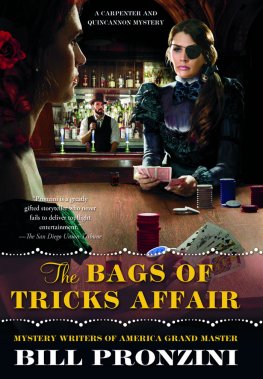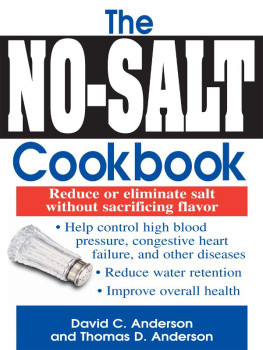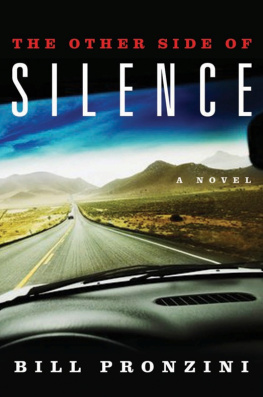Bill Pronzini - The Pillars of Salt Affair
Here you can read online Bill Pronzini - The Pillars of Salt Affair full text of the book (entire story) in english for free. Download pdf and epub, get meaning, cover and reviews about this ebook. City: New York, year: 1967, publisher: Leo Margulies, genre: Detective and thriller. Description of the work, (preface) as well as reviews are available. Best literature library LitArk.com created for fans of good reading and offers a wide selection of genres:
Romance novel
Science fiction
Adventure
Detective
Science
History
Home and family
Prose
Art
Politics
Computer
Non-fiction
Religion
Business
Children
Humor
Choose a favorite category and find really read worthwhile books. Enjoy immersion in the world of imagination, feel the emotions of the characters or learn something new for yourself, make an fascinating discovery.
- Book:The Pillars of Salt Affair
- Author:
- Publisher:Leo Margulies
- Genre:
- Year:1967
- City:New York
- Rating:5 / 5
- Favourites:Add to favourites
- Your mark:
- 100
- 1
- 2
- 3
- 4
- 5
The Pillars of Salt Affair: summary, description and annotation
We offer to read an annotation, description, summary or preface (depends on what the author of the book "The Pillars of Salt Affair" wrote himself). If you haven't found the necessary information about the book — write in the comments, we will try to find it.
The Pillars of Salt Affair — read online for free the complete book (whole text) full work
Below is the text of the book, divided by pages. System saving the place of the last page read, allows you to conveniently read the book "The Pillars of Salt Affair" online for free, without having to search again every time where you left off. Put a bookmark, and you can go to the page where you finished reading at any time.
Font size:
Interval:
Bookmark:
Bill Pronzini as Robert Hart Davis
The Pillars of Salt Affair
Prologue
The three men walked single-file, climbing steadily upward along a pine-needled path that wound through heavy growth of Douglas fir and Sitka spruce. Below them, nestled in a valley bounded by rising slopes of heavy timberland, was the small lumber community of Kamewa, Oregon, from where they had begun their climb.
Although it was only early afternoon, the shadows in the wood were long and deep. Thin shafts of pale sunlight filtered through the leafy ceiling above them, and the air was cool and moist.
As the three men walked, they could smell the fresh, mingling odors of the fir and spruce, and that of growing moss, ferns, sweet syringa and Oregon grape. The only sound was their quiet footfalls on the spongy cushion of the path.
The man in the lead was dressed in a plaid hunting cap and a bright red-and green lumber jacket. He carried a Winchester .270 deer rifle in the crook of his arm. The other two men wore similarly colored jackets, and carried small canvas knapsacks and binocular cases slung over their shoulders.
They paused for a moment to rest, nearly three-quarters of the way up. The darker of the two men carrying the knapsacks took a handkerchief from his khaki trousers and wiped his forehead. The man in the plaid hunting cap grinned.
Not used to hiking in the woods, eh? he asked. How much further is it? Napoleon Solo said, squatting to massage his aching ankles. His feet seemed to be suffocating inside his tight hiking boots. They had been walking for over an hour.
Not far, the man in the plaid hunting cap said, answering his question. About a quarter of a mile.
It seems to me, Illya Kuryakin commented dryly, that you said the same thing two miles back.
The mans grin widened. His name was Barney Dillon, and he was a foreman at the Kamewa Lumber Company, located at the northern end of the town below. He had agreed to act as their guide when they had arrived in Kamewa that noon.
Youll be able to see it when we crest the slope, Dillon said.
Are you sure we couldnt have ridden up? Solo asked.
We could have, Dillon said, if the road had been open. But we had a slide day before yesterday. Cant figure how it happened, this being the dry season, but it happened all right. Theyre still trying to clear the road.
Solo stood and adjusted the knapsack on his back. He had held some doubts from the beginning as to the authenticity of the report that had brought them to this isolated logging community near the Oregon coast, but he reserved final judgment until they had seen the reservoir for themselves. If they had hiked all this way to gaze upon the shimmering blue waters of a man-made lake, he was going to have a few words to say to the people of Kamewa. But then there was the plain fact that no water, not a drop, ran from any of the taps and faucets in the town.
Well, Solo said with a joviality he did not feel at the moment, lets press onward shall we?
They began to walk again, moving along the path. When they reached the crest of the slope, some fifteen minutes later, Barney Dillon picked his way through a clump of tangled, decaying juniper and stood on a wide, flat sandstone rock. Solo and Illya clambered up to stand beside him.
There it is, Dillon said.
Below them, at the foot of a smaller slope that fell away much more gradually than the one they had just climbed, lay the reservoir they had come to see. It was ringed with a thickly knit growth of fir and spruce.
Solo took the binoculars from the case on his shoulder and peered through them. The denseness of the trees afforded him sight of only patches of the reservoir, gleaming brightly in the sunlight.
He adjusted the glasses. It seemed to him that the gleam was not that of sun on water, not the bright silver shimmer of dancing light. It was more like, Solo thought, the blinding whiteness of sun on fresh snow, of sun on hot white beach sand.
He turned, looking at Illya Kuryakin. Illya brushed a strand of blond hair from his forehead and shrugged. He lowered his own glasses. He had gotten the same impression.
Still the same, Dillon said. Been that way since sometime last night.
Lets go down for a closer look, Solo said.
They followed Barney Dillon as the big man picked his way down the slope. They had almost reached the bottom, were almost to the shoreline, when the growth thinned out enough to allow them a clear, unhindered view of the reservoir.
They stopped. It lay in front of them, a half-mile long and a quarter-mile wide. At the upper end, furthest away from where they stood, was the filtering plant, its pale green buildings shining dully in the sun. To one side lay the packed dirt road that led up from the town of Kamewa.
But Solo saw that with a cursory glance. His attention had been caught, and held, by the reservoir itself.
What he saw was not water.
What he saw was a solid white floor, unmoving, like the floor of a rock canyon. It shone a bleached, almost antiseptic white under the sun. The surface was irregular, almost but not quite flat, and its edges, where it touched the shore, were smooth and planed, like cement that had been carefully spread with a trowel to blend with the sloping landscape.
Solo turned to Barney Dillon.
Salt, Dillon said. Pure rock salt
I dont believe it, Illya Kuryakin said.
Neither did I, the first time I saw it.
They scrambled down the rest of the way to the edge of the reservoir. Dillon moved out to stand on the surface. Its solid, he said. We checked it this morning when we came out.
Solo and Illya followed him. They had begun to smell the salt now. It was not the fresh, pungent odor of ocean salt, but more the dry biting odor of processed sodium chloride.
The doubts Solo had held before vanished. It was salt, all right. But how was it possible? Only yesterday, Dillon had told him, the reservoir had been brimming with clean, fresh water fed from streams that wound down from the mountains. Only yesterday the people of Kamewa had been drinking that water, had been using it to wash their clothes and irrigate their gardens.
Napoleon Solo said, you first began to notice the change last night?
Barney Dillon nodded, the tap water tasted tacky at first, he said, then later, it became undrinkable. Like sea water. Finally, about ten oclock, the water supply shut off completely.
You came up to investigate this morning?
First thing, Dillon said. This is what we found.
Solo shook his head, glancing around him at the white surface of the reservoir. Pure water hardening, crystallizing into rock salt. Its a scientific impossibility.
Well it happened, Dillon said. You can see for yourself.
I would be willing to wager, Illya said, that this is not a natural phenomenon.
Hmm, Solo said thoughtfully. Some new kind of chemical, most likely. Synthetically made. But for what reason? What purpose would it serve to turn a small mountain reservoir like this one into salt?
I dont know, Illya said, but Im beginning to get an uneasy feeling.
I think I know what you mean, Solo said pointedly. He dropped to one knee and swung the knapsack from his back. He took a small geologists pick from inside and chipped a piece free from the surface. He picked it up, sniffing it, and then touched the tip of his tongue to it.
It doesnt taste or smell any differently than common rock salt. He said. He put the chip in the knapsack and stood again. I think we had best get this off to U.N.C.L.E. as soon as possible. Maybe our laboratory scientists can
The bullet missed him by inches.
He heard the crack of the high-powered rifle a split instant before the bullet struck just to his left, sending splinters of salt flying, and he had no time to react then. But before the echoes of that first shot had died amongst the trees, both he and Illya had hurled themselves forward, in a low running crouch, towards the cover afforded by the growth at the bank of the reservoir.
Font size:
Interval:
Bookmark:
Similar books «The Pillars of Salt Affair»
Look at similar books to The Pillars of Salt Affair. We have selected literature similar in name and meaning in the hope of providing readers with more options to find new, interesting, not yet read works.
Discussion, reviews of the book The Pillars of Salt Affair and just readers' own opinions. Leave your comments, write what you think about the work, its meaning or the main characters. Specify what exactly you liked and what you didn't like, and why you think so.

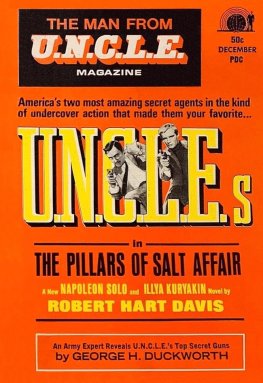
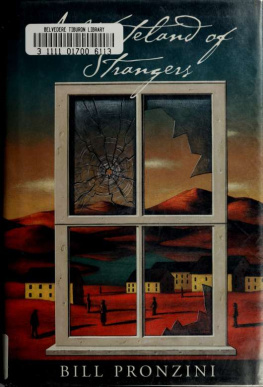
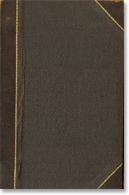


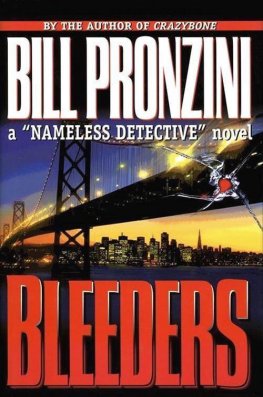
![Bill Pronzini - Sleuths [short story collection]](/uploads/posts/book/922610/thumbs/bill-pronzini-sleuths-short-story-collection.jpg)
![Bill Pronzini - Oddments [short story collection]](/uploads/posts/book/921630/thumbs/bill-pronzini-oddments-short-story-collection.jpg)
